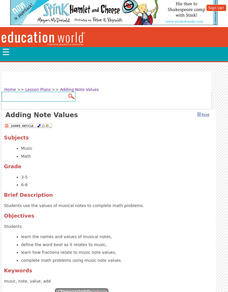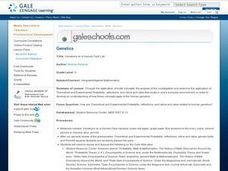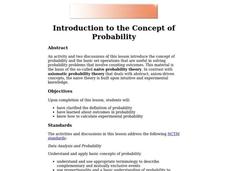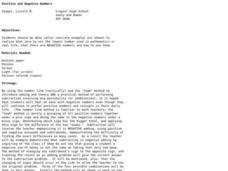EngageNY
Adding and Subtracting Rational Expressions
There's a fine line between a numerator and a denominator! Learners find common denominators in order to add and subtract rational expressions. Examples include addition, subtraction, and complex fractions.
EngageNY
An Appearance of Complex Numbers 1
Complex solutions are not always simple to find. In the fourth instructional activity of the unit, the class extends their understanding of complex numbers in order to solve and check the solutions to a rational equation presented in the...
Curated OER
Swinging Pendulum
Middle schoolers engage in an activity which demonstrates how potential energy (PE) can be converted to kinetic energy (KE) and back again. Given a pendulum height, students calculate and predict how fast the pendulum will swing by...
Curated OER
Fibonacci II
Study Fibonacci sequences and see a related set of numbers. Learn and review Lucas numbers and use of quadratic equations to find a general term of a sequence of numbers that is generated by a recurrence relation similar to Fibonacci's.
Curated OER
Economic Goals and Measuring Activity
Explore the role of government in the economy market. Young scholars analyze the economic decision-making process and how it takes into consideration additional cost, benefits, and public awareness of what they are trying to accomplish....
Statistics Education Web
Walk the Line
How confident are you? Explore the meaning of a confidence interval using class collected data. Learners analyze data and follow the steps to determine a 95 percent confidence interval. They then interpret the meaning of the confidence...
Curated OER
Adding Note Values
Learners use the values of musical notes to complete math problems. They study the names and values of musical notes, define the word beat as it relates to music. They complete math problems using music note values.
Curated OER
Eratosthenes And Radius of the Earth
Students calculate the radius of the earth. They use the method and data suggested by Eratosthenes. They investigate the interrelationships among mass, distance, force, and time through experimental processes.
Curated OER
Variations on a Human Face Lab
Ninth graders gain an application level understanding of probability, symmetry, and ratios and rates that exists in one's everyday environment relative to human genetics.
Curated OER
OUT OF THIS WORLD AND INTO OUR CLASSROOM
Students create projects on Astronomy using math concepts and use of Internet resources.
Curated OER
Foreign Stamps
Eighth graders convert the price of US stamps to those of a number of foreign currencies. They use conversion charts to make the changes.
Curated OER
Radiation Comparison Before and After 9-11
Using the NASA website, class members try to determine if changes could be detected in cloud cover, temperature, and/or radiation measurements due to the lack of contrails that resulted from the halt in air traffic after the attacks...
Curated OER
Introduction to the Concept of Probability
Middle and high schoolers have a clarified definition of probability, they explore about outcomes in probability and how to calculate experimental probability. They use computers to learn about probability.
Curated OER
A Fibonacci Primer
Upper graders explore the Fibonacci sequence. They examine the characteristics of the Fibonacci sequence, list the properties of the sequence and determine how it connects to Pythagorean Triples. Related thinking questions are included.
Curated OER
Converting Fractions to Decimals
Seventh graders take a simple fraction and give it decimal form either by the use of equivalent fractions or division with a calculator.
Curated OER
Building Bridges
Students identify the different types of bridges. Using the internet, they research information on how they are built by completing a scavenger hunt. Locating a specific area, they determine which type of bridge would be appropriate and...
Curated OER
Wavelengths of Light
Explore physical science by participating in a visual spectrum experiments. Budding scientists identify the colors in the color spectrum and view the colors in class by utilizing cellophane, flash lights, and other arts and crafts...
Curated OER
CHAOS AND COMPUTERS
Young scholars discuss the Chaos Theory and how it came into existence.They observe order and compare it to the randomness of chaos. The lesson features the playing of a game to reinforce concepts.
Curated OER
V-Numbers
High schoolers explore problem solving strategies. Gin a novel situation, students develop a mathematical theory. Through models and mathematics, high schoolers justify their solution. Students definea V-sets and discuss conjectures...
Curated OER
Positive and Negative Numbers
Students discover negative numbers and how to use them by using the number line and the "team" method.
Curated OER
Flying with Fractions
Learners test their knowledge of the Wright Brothers and their aircraft, and compute ratio of two numbers to determine the ratio between wing span and length of aircraft.
Curated OER
The 400 Problem
Young scholars develop the skills of problem solving and logical analysis. The conditions of when two subtraction sums are equal is examined to develop other skills like practicing arithmetic in context.
Curated OER
It's Really Heating Up in Here!
Students create and observe a greenhouse effect model and discuss the implications of global warming theory for engineers, themselves and the Earth. They discover that Global warming is becoming an increasing concern as we learn more...
Curated OER
Miami Metrozoo & Mathematics
Twelfth graders use Algebra and Geometry to solve a real life problem at the Zoo.








